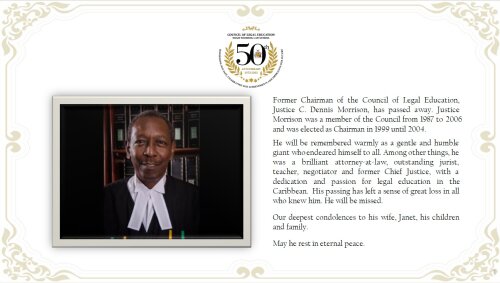Best Retirement Visa Lawyers in Port of Spain
Share your needs with us, get contacted by law firms.
Free. Takes 2 min.
List of the best lawyers in Port of Spain, Trinidad and Tobago
About Retirement Visa Law in Port of Spain, Trinidad and Tobago
If you're considering retiring in Port of Spain, Trinidad and Tobago, you'll need to apply for a self-sponsored or retirement visa. This visa allows foreign nationals who have sufficient funds or income, to reside in Trinidad and Tobago indefinitely. A retirement visa in Trinidad and Tobago is not considered a path to citizenship but it allows retirees to enjoy many benefits such as purchasing property and partaking in local social, cultural, and recreational activities.
Why You May Need a Lawyer
While the process of applying for a retirement visa may seem straightforward, there are many instances where legal assistance may be required. Complex paperwork, navigating the local immigration laws, and ensuring that you qualify for the visa can be challenging without a legal professional. A lawyer can also assist with land acquisition and understanding the taxes pertaining to your assets in Trinidad and Tobago. Many retirees prefer seeking legal help to ensure their application process is error-free and processing time is minimized.
Local Laws Overview
When planning to retire in Trinidad and Tobago, one must be aware of the local laws related to their retirement visa. The retiree should be over 45 years of age and should be financially capable to support themselves without having to work in Trinidad and Tobago. They must have an income of US$2000 per month from a pension or other regular earnings. In addition, the law allows retirees to invest and acquire properties under certain conditions. Your lawyer can provide detailed information about this and much more.
Frequently Asked Questions
1. Can I work or start a business with a retirement visa in Trinidad and Tobago?
No, a retirement visa does not grant you permission to work or start a business in Trinidad and Tobago.
2. Do I become a citizen after getting a retirement visa?
A retirement visa is categorized as a non-immigrant visa and does not automatically lead to citizenship.
3. Can my family join me if I get a retirement visa?
Yes, provisions can be made for immediate family members to join you.
4. How long does a retirement visa last?
The retirement visa in Trinidad and Tobago is indefinite meaning it has no end date.
5. Can I purchase property with a retirement visa?
Yes, the law allows retirees to invest and acquire properties under certain conditions in Trinidad and Tobago.
Additional Resources
For more information on the retirement visa process, refer to the following resources:
1. Trinidad and Tobago Government Services - offers a comprehensive guide to the visa process and other immigration matters.
2. LegalAffairs.gov.tt - the Ministry of Legal Affairs has lots of useful information on local laws.
3. Comprehensive guide to retiring overseas - available at the local library and online sources.
Next Steps
If you need legal assistance with the retirement visa, it's advisable to seek out an experienced immigration lawyer in Trinidad and Tobago. Be prepared to discuss your financial status and retirement plans in detail. Moreover, ensure all your necessary documentation, such as passport, proof of financial stability, and medical records are up-to-date and readily available. The path to retirement in Trinidad and Tobago can be made smooth with the right legal advice and assistance.
Lawzana helps you find the best lawyers and law firms in Port of Spain through a curated and pre-screened list of qualified legal professionals. Our platform offers rankings and detailed profiles of attorneys and law firms, allowing you to compare based on practice areas, including Retirement Visa, experience, and client feedback.
Each profile includes a description of the firm's areas of practice, client reviews, team members and partners, year of establishment, spoken languages, office locations, contact information, social media presence, and any published articles or resources. Most firms on our platform speak English and are experienced in both local and international legal matters.
Get a quote from top-rated law firms in Port of Spain, Trinidad and Tobago — quickly, securely, and without unnecessary hassle.
Disclaimer:
The information provided on this page is for general informational purposes only and does not constitute legal advice. While we strive to ensure the accuracy and relevance of the content, legal information may change over time, and interpretations of the law can vary. You should always consult with a qualified legal professional for advice specific to your situation.
We disclaim all liability for actions taken or not taken based on the content of this page. If you believe any information is incorrect or outdated, please contact us, and we will review and update it where appropriate.














